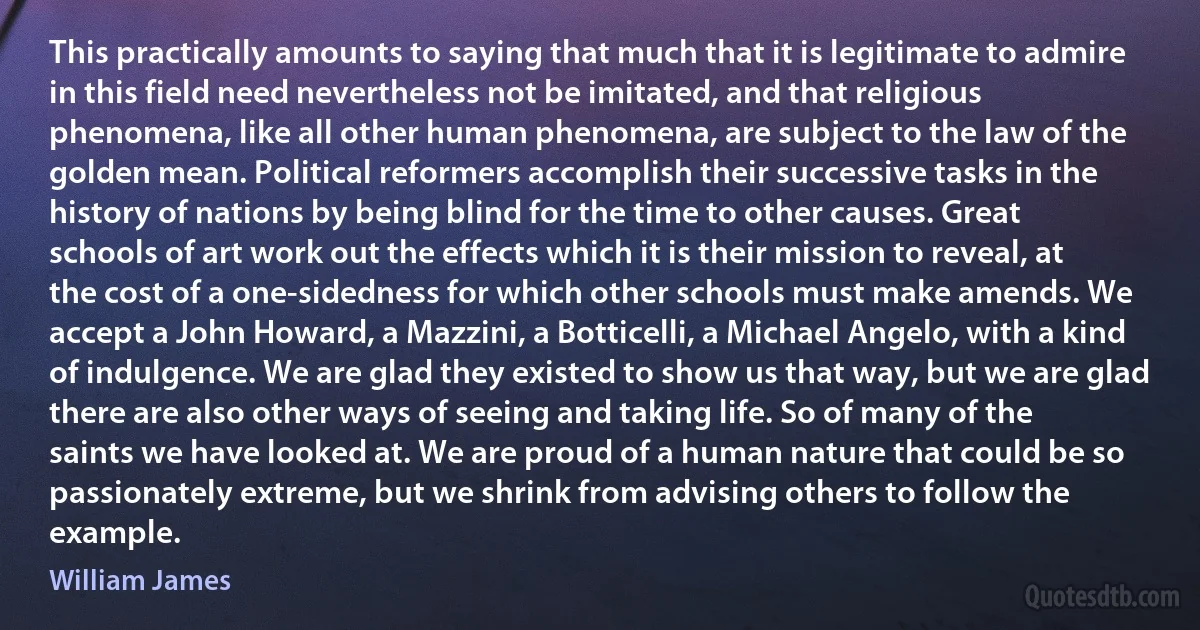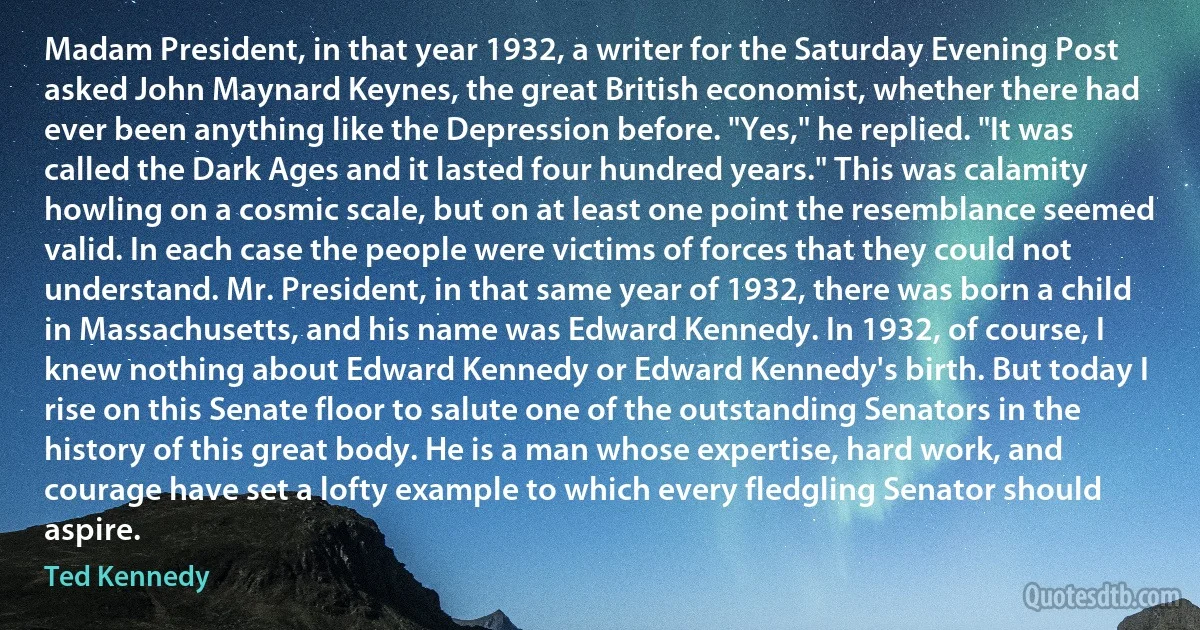Example Quotes - page 93
The U.S. government directed, as Craig Murray so eloquently documented, the London prosecutor James Lewis... It was judicial pantomime. Lewis and the judge insisted they were not attempting to criminalize journalists and muzzle the press while they busily set up the legal framework to criminalize journalists and muzzle the press. And that is why the court worked so hard to mask the proceedings from the public, limiting access to the courtroom to a handful of observers and making it hard and at times impossible to access the trial online. It was a tawdry show trial, not an example of the best of English jurisprudence but the Lubyanka.

Chris Hedges
Listening to Callas is like reading Shakespeare: you're always going to be knocked senseless by some incredible insight into humanity. She is a huge bonfire! The thread, the "inner serpent" that she would get in certain music was so complete - for example, in the Lucia recording, the phrase "Alfin, son tua." Lucia, at her absolute happiest moment, would have said to Edgardo, "I am finally yours." For me, the woman Lucia came to life in that moment, and I understood why she was out of her mind, you know? You've got it all in that one phrase.

Maria Callas
I used to listen again and again to recordings by Maria Callas. She was so musical and so theatrical at the same time. That is rare! I admire the way she cares for the words, so that everything comes from the text. She takes everything from the text and the music to elaborate a character and make her really interesting and impressive. She brings her own nature to the part - what she is, her passion, her fragility, doubts, feelings, violence - everything she is. And she never betrays the text or the music. We're very different, thank goodness, and I am happy with my own voice. But I feel very close to her in terms of discipline - trying to be as disciplined as she. She is an example to follow! Maybe in the past, people were more interested in voice and beautiful sounds. Maria Callas changed that. She arrived, brought a new way of doing opera, opened the way for us. We don't have any excuse now for not doing it!

Maria Callas
The soldiers of the State are necessarily recruited among the natives. They don't immediately shed habits blood thirsty handed down from generation to generation. The example of white officers, discipline military, will inspire them with the horror of human trophies of which they are ready to be proud. It's in their leaders that they must see the living demonstration of this higher principle that the exercise of authority is not to be confused with cruelty: the second ruins the first. I like to think that our agents, almost all volunteers from the ranks of the Belgian army, are always present atmind the rules of the honorary career in which they are engaged.

Leopold II of Belgium
The battle to save life is still going on. Up till now Lao Chiu has already lived for forty-four days. He lives on stubbornly and endures all suffering. Already he has become a banner, a fresh red banner. Many people regard him as a source of encouragement and as a model for them. Many consider him as a personification of the noble qualities of the working class and as a shining example of the great spirit of communism.
This battle to save life will eventually be won. The fact that Lao Chiu has lived until now is already a medical marvel. He has passed through one crisis after another and later he may face still more. But he will certainly live. Blind faith in established experience has been shattered, outmoded regulations have been smashed.

Ba Jin
I want our young people to know that they matter, that they belong. So don't be afraid-you hear me, young people? Don't be afraid. Be focused. Be determined. Be hopeful. Be empowered. Empower yourselves with a good education, then get out there and use that education to build a country worthy of your boundless promise. Lead by example with hope, never fear. And know that I will be with you, rooting for you and working to support you for the rest of my life.

Michelle Obama
At Chicago, Hayek put aside his more technical economic work for the development of a social and political theory that became in time the most ambitious and complete synthesis to emerge from the ranks of the post-war Right. Among its themes - the overriding significance of the rule of law, the need for social inequality, the function of unreflective tradition, the value of a leisured class - were many cultivated by Strauss across the campus. Neither thinker, however, ever referred to the other. Did temperamental antagonism, or intellectual indifference, dictate the silence? Whatever the case, latent tensions of outlook between them were to find expression in due course. Schmitt, on the other hand, was never far from Hayek's mind – standing for the prime example of a skilled jurist whose sophistry helped to destroy the rule of law in Germany, yet a political theorist whose stark definitions of the nature of sovereignty and the logic of party, at any rate, had to be accepted.

Friedrich Hayek
In terms of his personal characteristics, Hayek was a very complicated personality. He was by no means a simple person. He was very outgoing in one sense but at the same time very private. He did not like criticism, but he never showed that he didn't like criticism. His attitude under criticism, as I found, was to say: "Well, that's a very interesting thing. At the moment, I'm busy, but I'll write to you about it more later." And then he never would! On the other hand, he wasn't like von Mises. He wasn't intolerant at all. You cannot conceive of Hayek doing the kind of thing that Mises did, when, for example, he wouldn't talk to Machlup for three years because Machlup had come out for floating exchange rates at a Mont Pelerin meeting. Hayek did not do that. That was, I believe, because of the influence of the London School on him. He was very much tempered by the London School.

Friedrich Hayek
The book, as it stands, seems to me to be one of the most frightful muddles I have ever read, with scarcely a sound proposition in it beginning with page 45, and yet it remains a book of some interest, which is likely to leave its mark on the mind of the reader. It is an extraordinary example of how, starting with a mistake, a remorseless logician can end up in bedlam.

Friedrich Hayek
But their legacies are as alive as ever, together right here in Boston. The John F. Kennedy Library next door is a symbol of our American idealism; the Edward M. Kennedy Institute for the United States Senate as a living example of the hard, frustrating, never-ending, but critical work required to make that idealism real. What more fitting tribute, what better testament to the life of Ted Kennedy, than this place that he left for a new generation of Americans: a monument not to himself, but to what we, the people, have the power to do together.

Ted Kennedy
The artist is usually a child of his times, especially if his formative years fell in the period of early socialism. My formative years coincided with that period, and I was totally caught up in the socialist movement. At that time, the idea of a conscious commitment to serve the proletariat was the farthest thing from my mind. But what use to me were principles of beauty like those of the Greeks, for example, principles that I could not feel as my own and identify with? The simple fact of the matter was that I found the proletariat beautiful.

Käthe Kollwitz
I remember reading an article about Frasier when it was going off the air – a very sad obituary from a TV writer who said that Frasier was such a smart show, and it was for the Mensa set. And he gave an example, where he quoted some line about a woman that Frasier thinks is very mean and he says, "Her idea of tough love is the Spanish Inquisition.” And they thought that was very smart-just because he mentioned something from history.

Louis C.K.
In 1928 I designed a photo-montage frieze of 24 by 3.5 m for our 'Pressa' pavilion. It became the example par excellence for all larger-than-life montages, which were a permanent feature of the exhibitions from then on. During Majakovskij's stay in Berlin in 1923 I was commissioned to design his book 'For the Voice'. The book was recognized as the starting-point of a new typography, and the Gutenberg Society in Mainz made me a member. Another field of my work is the artistic and poly-graphic design of albums and periodicals.

El Lissitsky
All modern wars, even when their aims are the traditional ones, such as territorial aggrandizement or the acquisition of scarce resources, are cast as clashes of civilizations - culture wars - with each side claiming the high ground, and characterizing the other as barbaric. The enemy is invariably a threat to "our way of life," an infidel, a desecrator, a polluter, a defiler of higher or better values. The current war against the very real threat posed by militant Islamic fundamentalism is a particularly clear example.

Susan Sontag
Having thought it right to leave behind me some account of my friends and benefactors, it is in a manner necessary that I also give some account of myself; and as the like has been done by many persons, and for reasons which posterity has approved, I make no further apology for following their example. If my writings in general have been useful to my contemporaries, I hope that this account of myself will not be without its use to those who may come after me, and especially in promoting virtue and piety, which, I hope I may say, it has been my care to practise myself, as it has been my business to inculcate them upon others.

Joseph Priestley
[I]f these islands were to be annexed they would present to us, in the most aggravated form, the difficulty arising from marked differences of race, which occurred already in some of our colonial possessions. Where the superior race was very large in numbers, and the less developed and less civilized race were small, the difficulty was little felt. In Porto Rico, for example, although there was a very large number of negroes-now, happily, no longer slaves-yet the number of Whites was extremely large in comparison, and the slave emancipation had been effected without difficulty. Jamaica was not like Porto Rico. The Whites were very small in number in Jamaica compared with the less developed race.

William Ewart Gladstone
History often repeats itself. For example, World War I and World War II. But rest assured that there are many people in all walks of life-likened to military officer Stanislav Petrov, activist Malala Yousafzai, and politician President Jimmy Carter-who are doing everything possible to prevent World War III.

Newton Lee
One example of these kinds of statistics comes from Evolution: Possible or Impossible by James F. Coppedge [who] cites an article by Ulric Jelinek ... which claims that the odds are 1 in 10^243 against "two thousand atoms" (the size of one particular protein molecule) ending up in precisely that particular order "by accident." Where did Jelenik get that figure? From Pierre Lecompte du Nouy... who in turn got it from Charles-Eugene Guye, a physicist who died in 1942. Guye had merely calculated the odds of these atoms lining up by accident if "a volume" of atoms the size of the Earth were "shaken at the speed of light," failing to factor in laws of chemistry, which create preferences for the formation and behavior of molecules, and ignoring that there are millions if not billions of different possible proteins. This calculation comes to Coppedge third-hand, and is now outdated (it was calculated before 1942, even before the discovery of DNA).

Pierre Lecomte du Noüy
But, presenting to your weakness the gift of the example of His own flesh, the more perfect Adam-that is, Christ, more perfect on this account as well (as on others), that He was more entirely pure-stands before you, if you are willing (to copy Him), as a voluntary celibate in the flesh. If, however, you are unequal (to that perfection), He stands before you a monogamist in spirit, having one Church as His spouse, according to the figure of Adam and of Eve, which (figure) the apostle interprets of that great sacrament of Christ and the Church, (teaching that), through the spiritual, it was analogous to the carnal monogamy.

Tertullian
The whole position is a crystal clear example of the proposition that commitments and power must be balanced. Failure to balance them leads to bankruptcy, moral, political, and diplomatic. Neither Britain nor America was capable of paying the debt of honour.
Why?
Not because we did not support the League. Not because we did not believe in collective security. Not because we loved the Japanese. The reason is much simpler. Years of pacifism, disarmament, and false economy had deprived us of the power to do so.

Quintin Hogg, Baron Hailsham of St Marylebone



